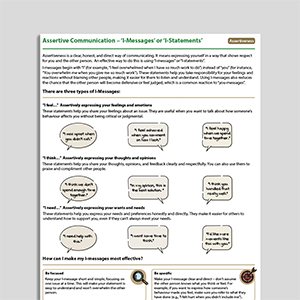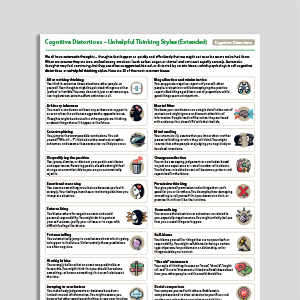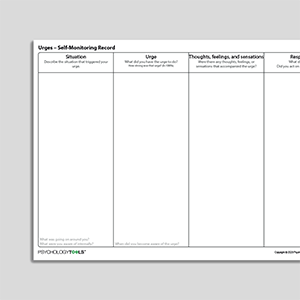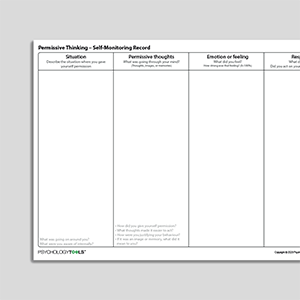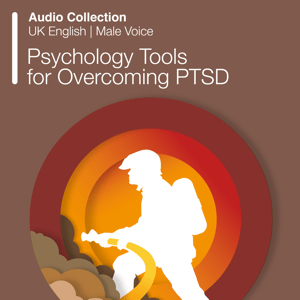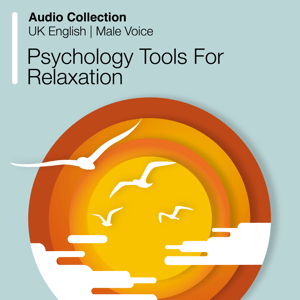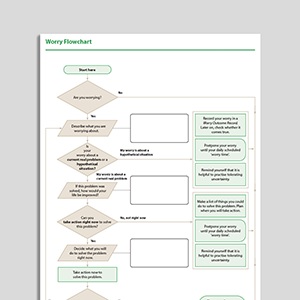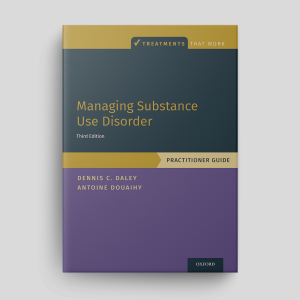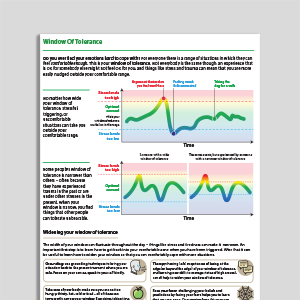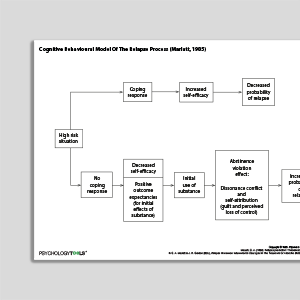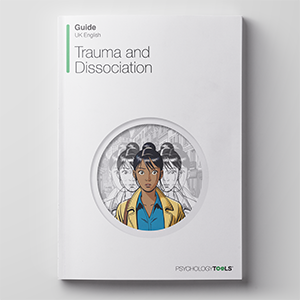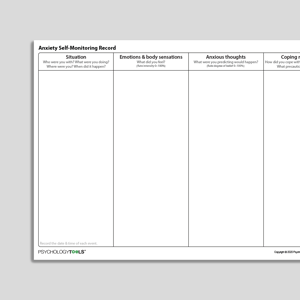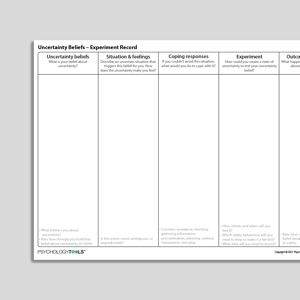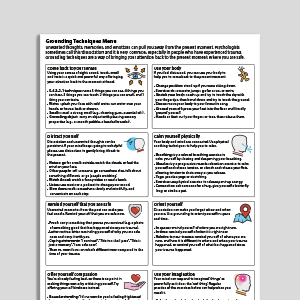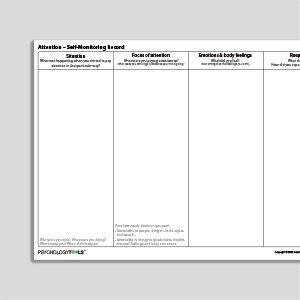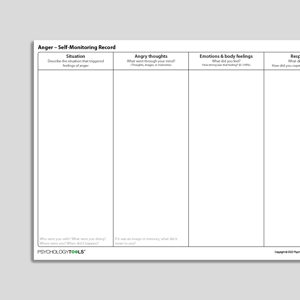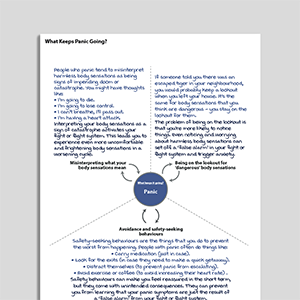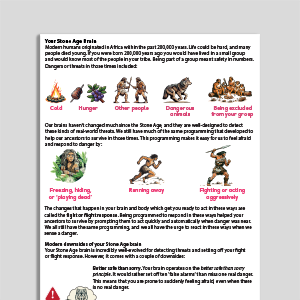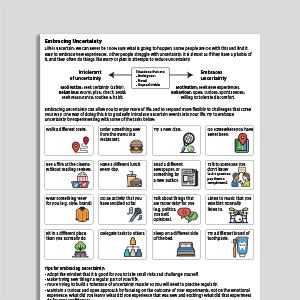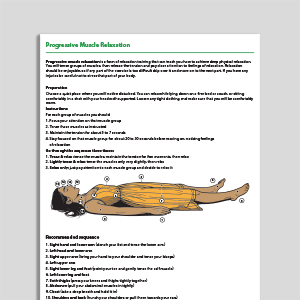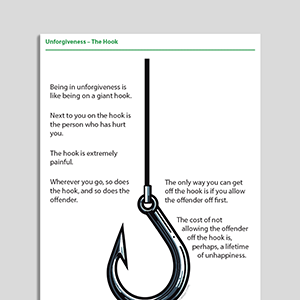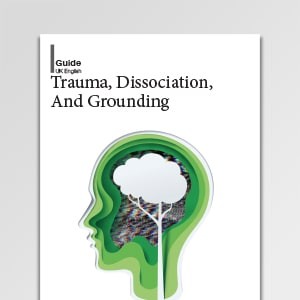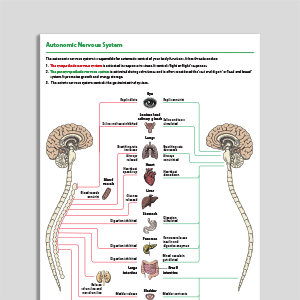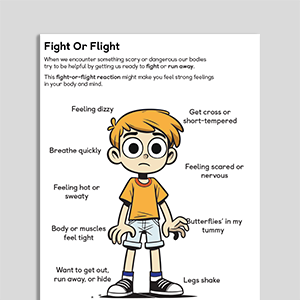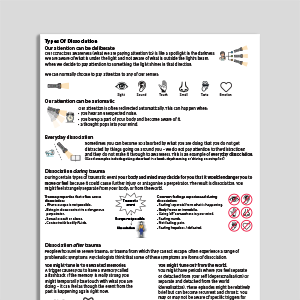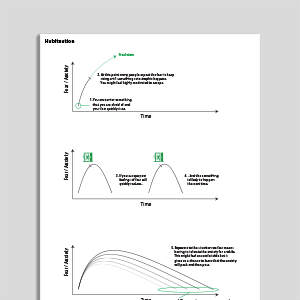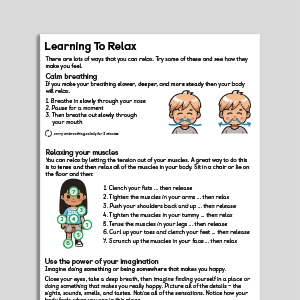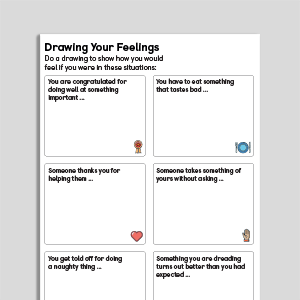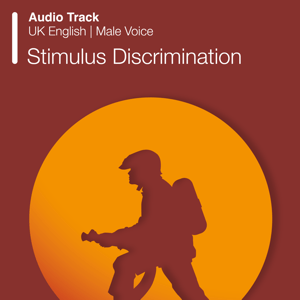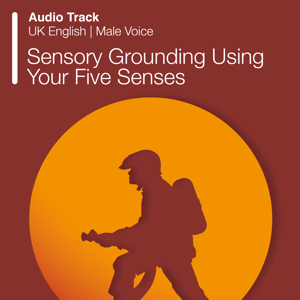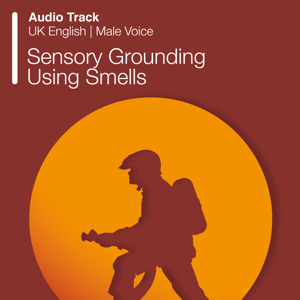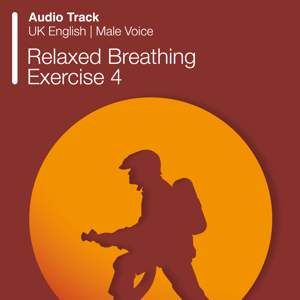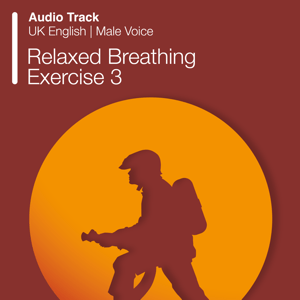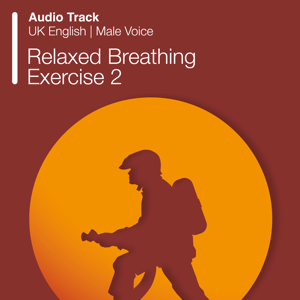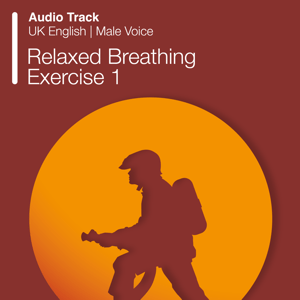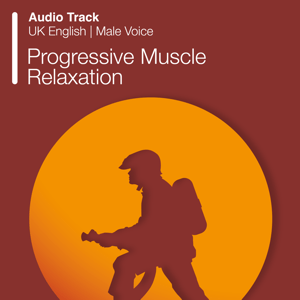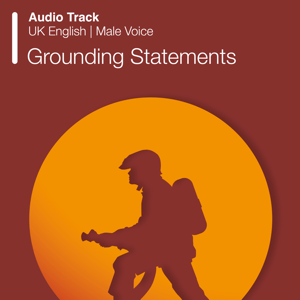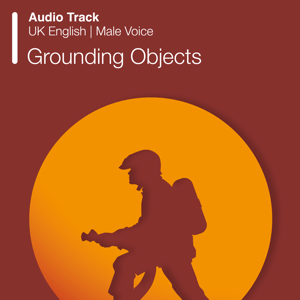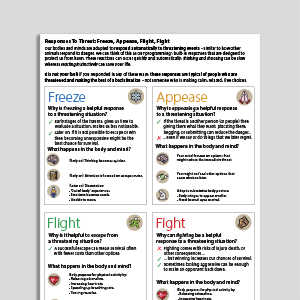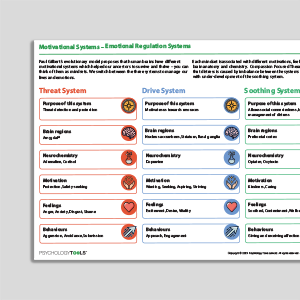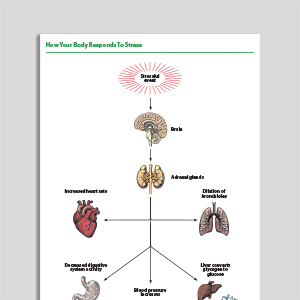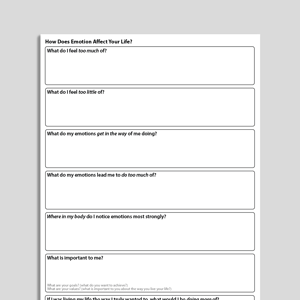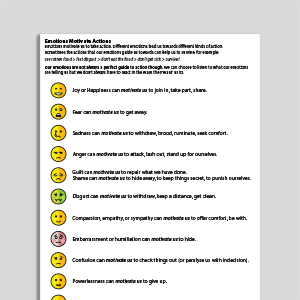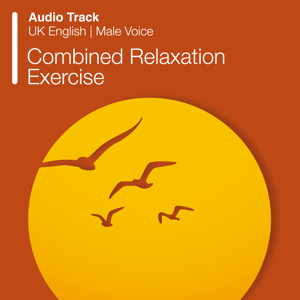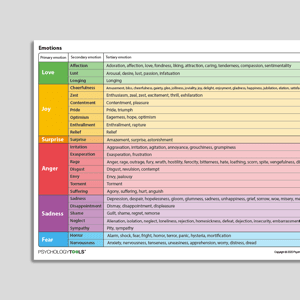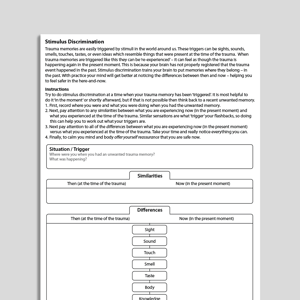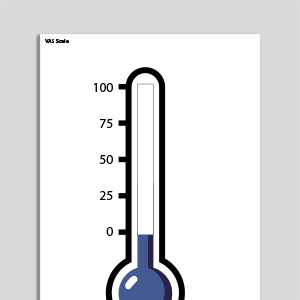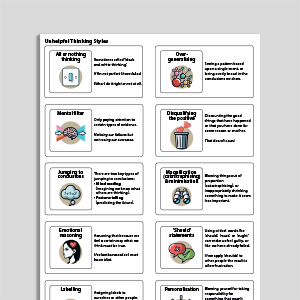Affect Regulation / Emotion Regulation
Affect regulation, or emotion regulation, is the ability of an individual to modulate their emotional state in order to adaptively meet the demands of their environment. Individuals with a broad range of affect regulation strategies will be able to flexibly adapt to a range of stressful situations. Individuals who struggle with emotional regulation may fall back upon a more limited range of stereotyped strategies that are not as successful in meeting their needs, or which come with more severe unintended consequences. The ability to successfully regulate emotion is sometimes viewed in the light of attachment theory (Bowlby, 1969/1982).
Showing 1 to 50 of 69 results
Cognitive Distortions – Unhelpful Thinking Styles (Extended)
Cognitive Distortions – Unhelpful Thinking Styles (Extended)
Urges – Self-Monitoring Record
Urges – Self-Monitoring Record
Permissive Thinking – Self-Monitoring Record
Permissive Thinking – Self-Monitoring Record
Audio Collection: Psychology Tools For Overcoming PTSD
Audio Collection: Psychology Tools For Overcoming PTSD
Audio Collection: Psychology Tools For Relaxation
Audio Collection: Psychology Tools For Relaxation
Managing Substance Use Disorder (Third Edition): Practitioner Guide
Managing Substance Use Disorder (Third Edition): Practitioner Guide
Cognitive Behavioral Model Of The Relapse Process (Marlatt & Gordon, 1985)
Cognitive Behavioral Model Of The Relapse Process (Marlatt & Gordon, 1985)
Anxiety - Self-Monitoring Record
Anxiety - Self-Monitoring Record
Uncertainty Beliefs – Experiment Record
Uncertainty Beliefs – Experiment Record
Grounding Techniques Menu
Grounding Techniques Menu
Attention - Self-Monitoring Record
Attention - Self-Monitoring Record
Anger - Self-Monitoring Record
Anger - Self-Monitoring Record
Your Stone Age Brain (CYP)
Your Stone Age Brain (CYP)
Trauma, Dissociation, And Grounding (Archived)
Trauma, Dissociation, And Grounding (Archived)
Drawing Your Feelings (CYP)
Drawing Your Feelings (CYP)
Sensory Grounding Using Your Five Senses (Audio)
Sensory Grounding Using Your Five Senses (Audio)
Sensory Grounding Using Smells (Audio)
Sensory Grounding Using Smells (Audio)
Relaxed Breathing Exercise 4 (Audio)
Relaxed Breathing Exercise 4 (Audio)
Relaxed Breathing Exercise 3 (Audio)
Relaxed Breathing Exercise 3 (Audio)
Relaxed Breathing Exercise 2 (Audio)
Relaxed Breathing Exercise 2 (Audio)
Relaxed Breathing Exercise 1 (Audio)
Relaxed Breathing Exercise 1 (Audio)
Progressive Muscle Relaxation (Audio)
Progressive Muscle Relaxation (Audio)
Responses To Threat: Freeze, Appease, Flight, Fight
Responses To Threat: Freeze, Appease, Flight, Fight
Motivational Systems (Emotional Regulation Systems)
Motivational Systems (Emotional Regulation Systems)
How Your Body Responds To Stress
How Your Body Responds To Stress
How Does Emotion Affect Your Life?
How Does Emotion Affect Your Life?
Combined Relaxation Exercise (Audio)
Combined Relaxation Exercise (Audio)
Unhelpful Thinking Styles (Archived)
Unhelpful Thinking Styles (Archived)
Links to external resources
Psychology Tools makes every effort to check external links and review their content. However, we are not responsible for the quality or content of external links and cannot guarantee that these links will work all of the time.
Information Handouts
- Distress tolerance worksheet
- Interpersonal effectiveness skills handout (DEAR MAN)
- Working with primary and secondary emotions
- Emotion myths worksheet
- Guided mindfulness practice script
- Reality acceptance skills overview
- DBT skills mindfulness overview
- States of mind handout (logical, emotional, wise)
- DBT skills quick reference sheet
Presentations
- Adolescent mentalization based therapy | Louise Duffy, Helen Griffiths | 2016
- What is mentalizing and why do it? | Chris Taylor
- Mentalisation Based Therapy – clinical slidesucl.ac.uk
- Mentalisation Based Therapy – training slides ucl.ac.uk
Self-Help Programmes
-
Facing Your Feelings (Workbook)
| Center For Clinical Interventions | 2012
- Module 1: Understanding Distress Intolerance
- Module 2: Accepting Distress
- Module 3: Improving Distress
- Module 4: Tolerating Distress
Treatment Guide
- Emotion regulation, interpersonal effectiveness, and distress tolerance skills for adolescents: A treatment manual | Charlers Bonner | 2002
- A quality manual for MBT | Anthony Bateman, Dawn Bales, Joost Hutsebaut | 2014
Worksheets
- DBT skills training pros and cons worksheet
- DBT behavior chain and solution analysis worksheet
- Opposite action handout and worksheet
- Check the facts handout and worksheet
- DBT multi-purpose pros and cons worksheet
Recommended Reading
- Hofmann, S. G. (2014). Interpersonal emotion regulation model of mood and anxiety disorders. Cognitive Therapy and Research, 38(5), 483-492.
- Bowlby, J. (1969/1982). Attachment and loss: Vol. 1. Attachment (2nd edition). New York: Basic Books
What Is Affect Regulation?
Techniques for Affect Regulation
Affect regulation is a broad category that encompasses almost anything done to manage our emotional state including:acceptance (the effortful ‘allowing’ of the experience of aversive states without engaging in avoidance or distraction)
distress tolerance
response modulation (the strategic use of exercise or relaxation)
urge surfing
References
Bowlby, J. (1969). Attachment and loss: Volume I. Attachment. London: The Tavistock Institute of Human Relations.
Bowlby, J. (1982). Attachment and loss: retrospect and prospect. American journal of Orthopsychiatry, 52(4), 664.
